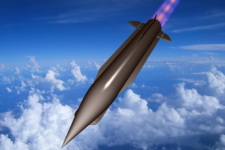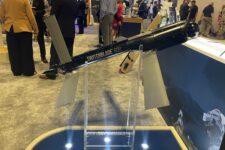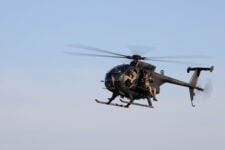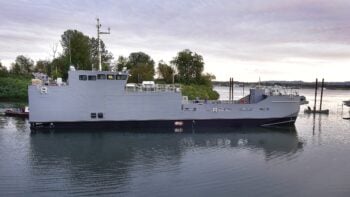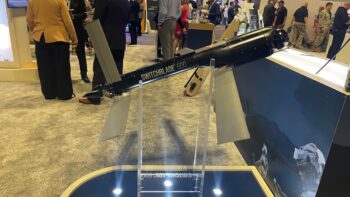
Shadow Minister for Defence Andrew Hastie reacts during Question Time at Parliament House on July 28, 2022 in Canberra, Australia. (Photo by Martin Ollman/Getty Images)
SYDNEY — The tripartite defense agreement known as AUKUS should remain the province of Australia, Britain and the United States and should not welcome New Zealand or Japan as new members, the Australian opposition party’s top defense expert says.
“Look, I think AUKUS’s focus should remain with the three countries already involved. And I think we’ve really got to be able to operate seamlessly with the transfer of the very sensitive secrets and intellectual property that’s involved with the heart of Pillar I and Pillar II,” Andrew Hastie, shadow defense minister and former member of the Australian Special Air Service (SAS), said in a Wednesday interview with Breaking Defense.
The principal goal of the security arrangement, which falls under Pillar I, is for Australia to buy three to five Virginia-class nuclear-powered attack submarines from the United States, and for Britain and Australia to build a small fleet of AUKUS SSNs for Australia to better deter China.
But Pillar II is much broader, comprising the development of a mix of advanced technologies and capabilities the three nations in fields like quantum computing, hypersonic missile systems, AI, cyber and electronic warfare. That’s the likeliest avenue for other countries to take in participating in AUKUS. Australian defense officials have been briefing New Zealand on AUKUS, and Japanese officials have made clear their interest in joining.
RELATED: New Zealand in AUKUS ‘no guarantee,’ but discussions active: Defense minister
Whether any additional countries become formal partners in AUKUS or not, Hastie said he’s certainly not against closer cooperation in the region.
“I think it’s really important that we made it clear that the arrangement is for our three countries, but we do need to find ways to collaborate far more closely with enduring partners like New Zealand, Japan, Canada, and other emerging friends throughout the world,” he said. “But particularly in Southeast Asia, I think we can do a lot of work with a number of partners.”
“And if we’re going to uphold the prosperity and security in the Indo-Pacific region, we can’t do it alone,” Hastie later said. “We can’t just do it through AUKUS. We’re going to do it through a coalition of countries, and AUKUS is a good starting point.”
While he is a staunch supporter of AUKUS, Hastie said the Australian government is moving too slowly to make the many additions, repairs and improvements to HMAS Stirling, the Western Australian sub base where the Virginia subs will call and SSN AUKUS will eventually be berthed.
Those improvements are meant to be ready by 2027, but the government apparently does not plan to spend any money on them until next year, and he is “concerned” about that. But Hastie is much more worried about the “acute housing shortage in Western Australia.”
“I’ve raised this to the Americans and the Department of Defense. And they’ve got to build more than probably 1,000 homes to house both UK and US families,” he said. It’s worth noting that Hastie represents a district quite close to HMAS Stirling. Australia is in the midst of a severe rental shortage, with prices sky-high and availability extremely limited.
Hastie, who said he has not had a government briefing on the funding for Western Australia, said he “always understood that [there] would be $9 billion flowing to Western Australia for this purpose since the announcement was made last year. We’ll know soon enough in May what this budget looks like,” he said. “But since last year, there’s been no new money and inflation is eating into the purchasing power of the defense budget.”
He has also not been briefed on the government’s defense budget since it came into office. Defense Minister Richard Marles continues to say the government has made real increases to the defense budget, but the only authoritative analysis of the budget, by the largely government-funded Australian Strategic Policy Institute, found that there was a real cut to the budget of $1.5 billion AUD ($970 million USD). All the planned increases appear to occur after the next election, when Labor may or may not be in power. The next Australian federal election will be held on or before September 27, 2025.
Hastie said he is concerned about fiscal matters because AUKUS, he noted, will “consume a lot of the budget, and I’m worried about the sustainment budgets required for Navy and Air Force, particularly with the large capabilities they operate.”
Positive Movements
While the budget criticism could be taken as the normal partisan bickering, there was a high note that Hastie wanted to point to — Tuesday’s passage of landmark arms export and security legislation.
“I think it’s really important to note that the opposition worked in the national interest with the Albanese government to pass the AUKUS-enabling legislation, which [US] President [Joe] Biden will have to certify and sign off, which is the the export control stuff that we that we worked on,” he said.
The AUKUS export controls are necessary for the entire enterprise to proceed. Without them, the three governments could not share intellectual property, highly classified information and the many technical details required to make building a nuclear-powered sub possible.
Hastie and other Liberal Party members had pressed the government to create a “joint defense committee,” structured along the lines of one that handles intelligence issues here. Hastie was chair of the joint intelligence body.
Under the current setup, the Senate and other parliamentary bodies provide oversight of defense. They are not entitled to have access to any classified material, and the majority of Australian defense budget, policy and operations are classified.
The former soldier has pressed for this reform for at least four years, most recently making his arguments in an op-ed in The Australian newspaper, saying, “There is no independent Joint Defence Committee where tough questions can be asked in a classified, protected space.”
In his interview with Breaking Defense, Hastie said a new committee would offer two main benefits as AUKUS grows: industry insight and government accountability.
“The Defense Committee will give the industry a voice through the parliament, directly to the Parliament, and I think that’s a really important mechanism for holding the government to account, whether they be a Liberal government or a Labor Government,” he said. “AUKUS is going to roll out over the next 15 to 20 years. This committee should act like an unblinking eye, making sure that AUKUS is being implemented as quickly as possible, and in the best way for our national interest.”


